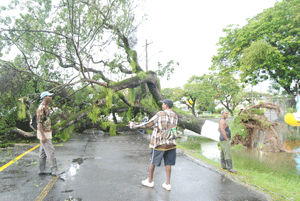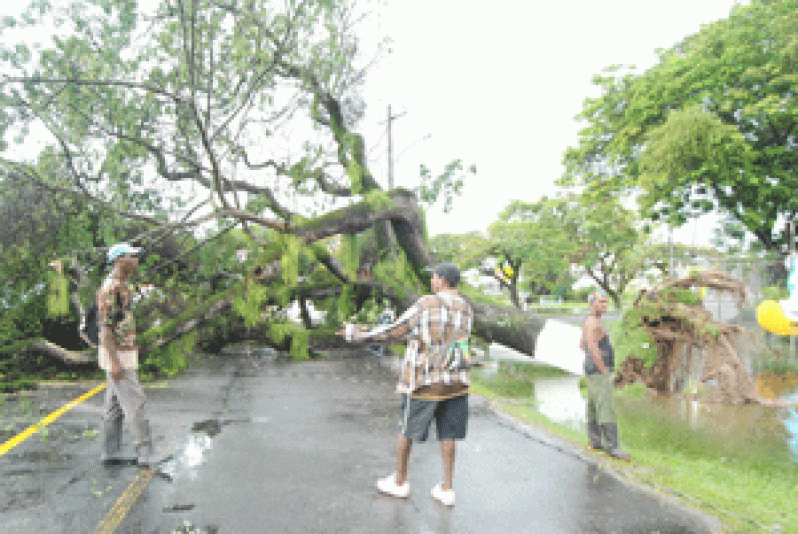GUYANA has a strong role to play in the work of key regional bodies such as the Caribbean Community (CARICOM), the Amazon Cooperation Treaty Organisation (ACTO), the Union of South American Nations (UNASUR), and the United Nations’ agencies, according to President Donald Ramotar.
 He pointed out that from a national perspective, over the past five years, Guyana has recorded continuous growth in its economy, despite a challenging global economic climate.
He pointed out that from a national perspective, over the past five years, Guyana has recorded continuous growth in its economy, despite a challenging global economic climate.
Guyana’s economic growth, he said, is due to strong macro-economic policies and a diverse economic base. “We have made significant advances across the various sectors of our economy…anchoring this development trend is the prioritisation of the interest of the people, whilst maintaining an environmentally sustainable growth trajectory,” the President declared.
He was at the time delivering the feature address, yesterday, at the opening ceremony of the 28th session of the Latin American and Caribbean Forestry Commission (LACFC), which Guyana is hosting this week at the Guyana International Conference Centre (GICC) at Liliendaal, Greater georgetown.
President Ramotar said the LACFC meeting comes at an important time within the global and regional context in that, at the global level, increasing emphasis has been placed on the role of forests in economic development, with tremendous importance being placed on furthering such development in the context of strong environmental management and stewardship; whilst Guyana’s advocacy within the trade and multilateral arena is very evident at the regional level.
The President said forests have continued to play an important role in the Caribbean region, and in Guyana in particular.
“In Guyana, our forest resources provide one of the main building blocks of our economy. In the (forestry) sector, we’ve seen significant spread of employment opportunities, facilitated at the large operator level, community levels, and the village economy,” he stated.
He also said that while the forests of Guyana support economic development, their contribution to the livelihood of the country’s indigenous peoples is also significant.
The President stressed that Guyana has taken the work in the forestry sector beyond the traditional areas, and has been engaged in a globally recognised programme of payment for forest-based services.
“Part of this programme of work includes Guyana’s partnership with the Kingdom of Norway, and the establishment of a world class partnership to demonstrate a workable solution to the global problem of climate change, which brings with it severe challenges to sustainable development,” he explained.
President Ramotar said Guyana’s partnership with Norway facilitates a chartered path which demonstrates how a country can earn payment for forest eco system services, and channel those resources towards building livelihoods, economic infrastructure, and sustainable environmental development.
In this regard, the Guyana Low Carbon Development Strategy (LCDS) has been developed, and it lays the foundation for a green economy set against the REDD+ framework, he said.
Thus, the LCDS is a national plan that aims to stimulate the creation of a low-deforestation, low-carbon, climate-resilient economy that would bring with it corresponding global benefits, he explained.
The President said Guyana has been engaged in furthering a programme of work that creates an enabling environment for this plan to thrive concomitant with fulfilling the country’s role in effective management of its natural resources through partnership with local and international agencies.
Stressing that Guyana has an important role to play in the LACFC, the President deemed the forum important in providing the space for policy level and technical discussions to take place among countries, in order to address forest issues on a regional basis.
And Minister of Natural Resources and the Environment, Robert Persaud, said the meeting comes at a time in Guyana when there has been rapid and expanding growth in forest-based sectors, such as timber harvesting and mining, as well as in new areas, such as eco tourism and eco services.
“In the past nine months, Guyana has seen declared gold production surpassing previous years, and timber production increasing when compared to previous years. These sectors are based in forests, and are sustained by continuing efforts in good environmental stewardship and management, as well as (in) utilising internationally approved organisational management systems,” he asserted.
Emphasising that Guyana’s forestry sector is extremely important to its national economy, Minister Persaud noted that this sector employs close to 20,000 persons, and contributes between US$40M and US$60M annually in export earnings.
Noting that Guyana has a growing community forestry programme which presently reflects close to 70 community forestry organisations with membership close to 3,000 persons, Minister Persaud said the production aspect is complemented by a well developed academic and tertiary skills training programme, with bachelors and masters level training available at the University of Guyana; diploma and certificate level programmes available at the Guyana School of Agriculture; and vocational level training offered at the Forestry Training Institute.
These programmes, he said, patterned after international standards and of high quality, are also available to regional students and invited delegates from Latin America and the Caribbean, to explore these as potential areas for additional cooperation and exchange in the area of capacity building and training.
Guyana is about to finalise the development of a strategic plan for the national resources sector, Minister Persaud said, and key pieces of legislation which govern the forestry sector have been revised.
While he noted that set areas of discussion have been outlined in the meeting’s agenda, Minister Persaud still urged that current matters faced by the region in the areas of forestry – including, but not limited to, the role of forest as a climate change mitigation solution — should be a topic for discussion.
Moreover, he said that as the regional and sub-regional groupings’ work plans for 2014-2015 are being finalised, focus should be placed on realistic, practical, and achievable outputs that would not only address existing areas, but also new challenges that confront the respective forestry sectors.
Minister Persaud stressed that, as representatives of the LACFC, the delegates’ importance should not be defined by the size of their countries’ individual economies relative to the global super powers; nor by size of the individual populations they represent; nor by geographic size of their individual countries, or export levels, but rather by their importance as a grouping of forest-based countries.
Assistant Director General of the Forestry Department of the United Nations Food and Agriculture Organisation (UNFAO), Mr. Eduardo Rojas-Briales, described the meeting as a sign of recognition of Guyana’s leadership in the international forest-related debate.
He noted that former President Dr Bharrat Jagdeo has been a tireless advocate for moving forward REDD+, and said he was sure the Guyana Government, now led by President Ramotar, would continue this crucial legacy.
According to the FAO website, the mandate of the LACFC is to advise the FAO on the forestry programme to be developed in the region, including formulation of policies for the sustainable management of forests and wildlife; and to analyse, facilitate and coordinate implementation of those policies at a regional level, besides aiding in the exchange of information and, through special bodies, advising on suitable practices and actions in regard to technical problems, and making appropriate recommendations in relation to those matters.
The 27th Session of the LACFC was held in Paraguay from March 5 to 9, 2012. This 28th Session of the LACFC concludes on Friday, September 13, 2013.



.jpg)








